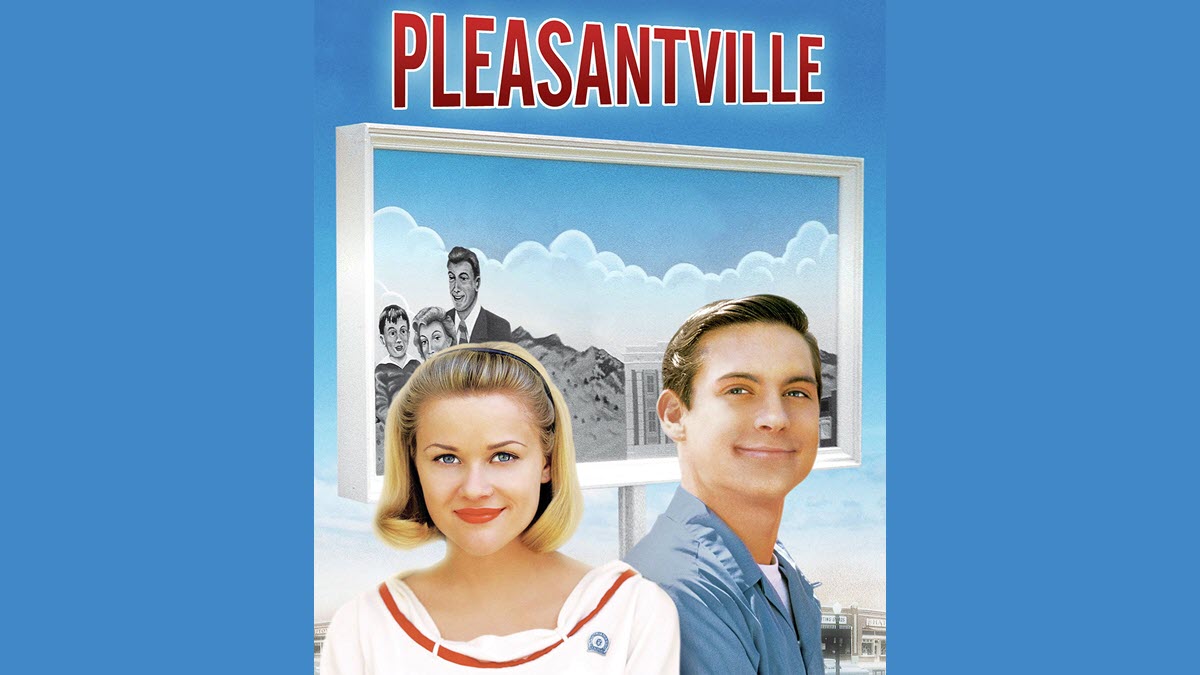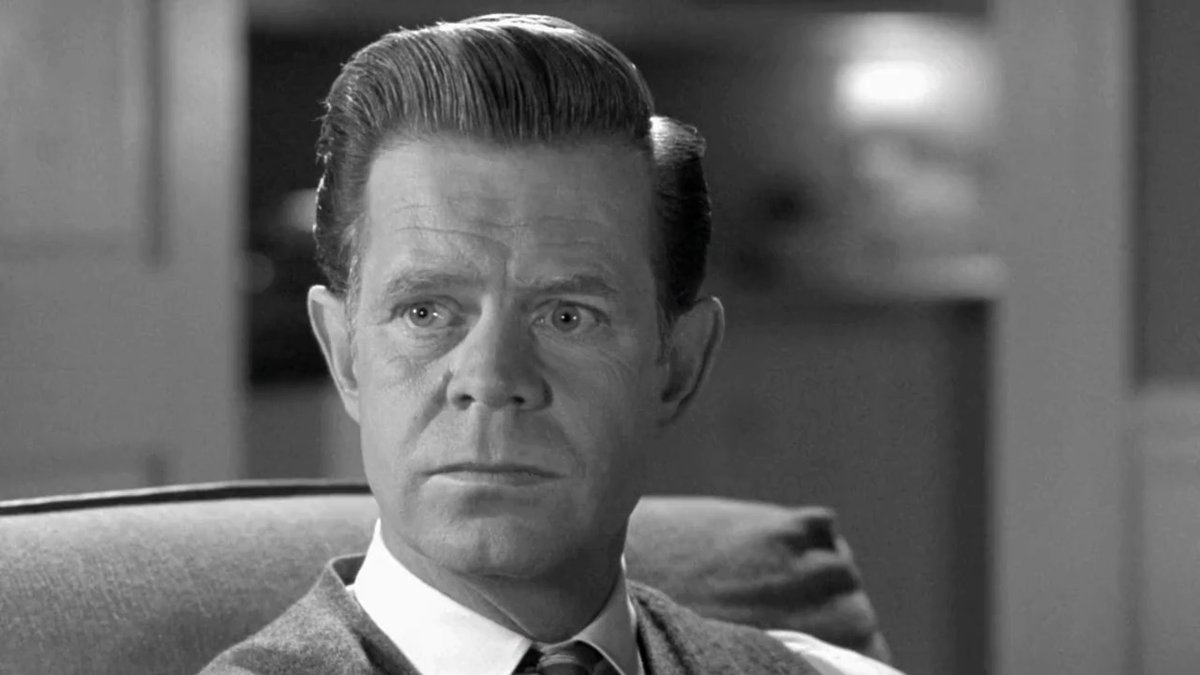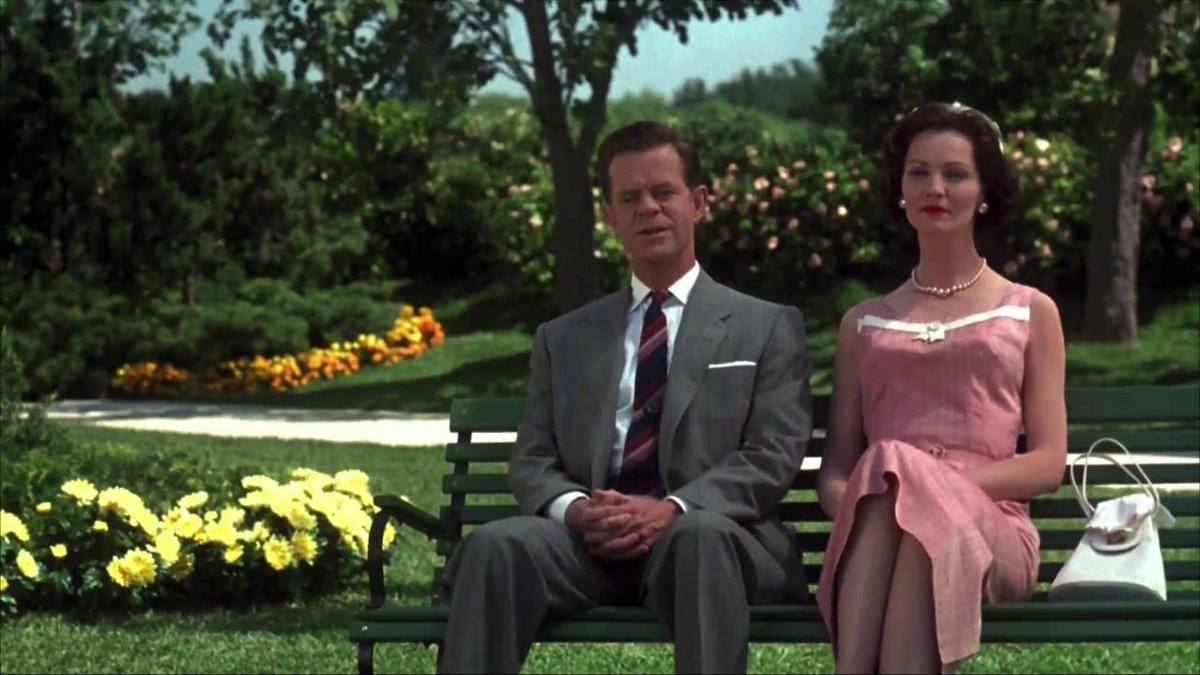In 1998, an unusual movie with a rather impressive cast was released. Pleasantville. Believe it or not, it& #39;s actually a pretty deep philosophical movie.
This is a thread of philosophical lessons pulled from my recent rewatch of Pleasantville https://abs.twimg.com/emoji/v2/... draggable="false" alt="😁" title="Grinsendes Gesicht mit lächelnden Augen" aria-label="Emoji: Grinsendes Gesicht mit lächelnden Augen">
https://abs.twimg.com/emoji/v2/... draggable="false" alt="😁" title="Grinsendes Gesicht mit lächelnden Augen" aria-label="Emoji: Grinsendes Gesicht mit lächelnden Augen">
This is a thread of philosophical lessons pulled from my recent rewatch of Pleasantville
At the start of the movie, David (Tobey Maguire) and Jennifer (Reese Witherspoon) are wildly different siblings, each searching for their "ideal life".
David& #39;s is Pleasantville, a TV series he& #39;s beyond obsessed with, and Jennifer& #39;s is being popular at school...
David& #39;s is Pleasantville, a TV series he& #39;s beyond obsessed with, and Jennifer& #39;s is being popular at school...
They are both, in different ways, suffering from Grass is Greener disease.
They believe that, if only XYZ will happen, they will be happy, things will be better, etc. etc.
They are dissatisfied with some facet of their present reality, and want it to change.
Sound familiar?
They believe that, if only XYZ will happen, they will be happy, things will be better, etc. etc.
They are dissatisfied with some facet of their present reality, and want it to change.
Sound familiar?
Be careful what you wish for.
We humans think we know what we want, but the truth is we have no idea. We think of first order effects, but rarely look further out.
You never know who or what is listening, and you might get what you asked for. Which brings us to...
We humans think we know what we want, but the truth is we have no idea. We think of first order effects, but rarely look further out.
You never know who or what is listening, and you might get what you asked for. Which brings us to...
The Law of Unintended Consequences.
You think you want X, or wish you could go back and change Y, but you can& #39;t predict how those changes will actually play out.
Life is too complex. Chaotic.
You think you want X, or wish you could go back and change Y, but you can& #39;t predict how those changes will actually play out.
Life is too complex. Chaotic.
As David and Jennifer get sucked into the world of Pleasantville, they quickly realize that what might have looked pleasant from the outside, really isn& #39;t so pleasant.
Everyone is stuck in a rut, living life on endless repeat.
BORING.
Everyone is stuck in a rut, living life on endless repeat.
BORING.
David doesn& #39;t want to rock the boat, he wants to keep his happy place pristine. Jennifer is a rebel, and immediately starts rocking the boat and knocking people out of their ruts.
You quickly realize a core human lesson: We don& #39;t know what we don& #39;t know.
You quickly realize a core human lesson: We don& #39;t know what we don& #39;t know.
Also, sometimes it takes an outside force to change our trajectory. As Newton said, an object in motion tends to stay in motion, and humans are no different.
You can live life, floating on the river, letting it dictate your course...or you can get off, explore, play, have fun.
You can live life, floating on the river, letting it dictate your course...or you can get off, explore, play, have fun.
Jennifer, and eventually David, help the people of Pleasantville to discover, hopes, dreams, and possibilities.
They also show them that taboos tend to hide the really good stuff ;) Taboos are mechanisms of control.
They also soon learn: fear of change is universal.
They also show them that taboos tend to hide the really good stuff ;) Taboos are mechanisms of control.
They also soon learn: fear of change is universal.
When everyone is stuck in a rut, they try to maintain the status quo. "Stay in your lane" and all that.
Some people will always strongly resist change.
Morpheus said it best:
Some people will always strongly resist change.
Morpheus said it best:
In Pleasantville, as people change, they move from black and white, to Technicolor.
Some try to hide the change, some are ashamed, some fearful.
Never, EVER try to hide your true self.
Resistance to change is futile (and painful). Change is THE universal constant.
Some try to hide the change, some are ashamed, some fearful.
Never, EVER try to hide your true self.
Resistance to change is futile (and painful). Change is THE universal constant.
People fear the new, the strange, the different...it has ever been this way.
For some, novelty and surprise and change are lovely. These are explorers, adventurers at heart.
For others, change is painful, especially for those who are comfortable and benefit from the status quo.
For some, novelty and surprise and change are lovely. These are explorers, adventurers at heart.
For others, change is painful, especially for those who are comfortable and benefit from the status quo.
How do those in power, those comfortable with how things are, fight back?
They begin with Us vs. Them, setting groups against each other, and with the threat of being outcast from your group.
In Pleasantville, we hear the words "They& #39;ll see you"...and then, "I don& #39;t care."
They begin with Us vs. Them, setting groups against each other, and with the threat of being outcast from your group.
In Pleasantville, we hear the words "They& #39;ll see you"...and then, "I don& #39;t care."
Fear of being outcast from your in-group is a powerful, ancient fear. In our tribal past, to be cast out was almost certain death. The evolutionary memory of that is STRONG.
A key part of Us vs. Them is "Differentism". It& #39;s all about the ways in which the "bad" group differs.
A key part of Us vs. Them is "Differentism". It& #39;s all about the ways in which the "bad" group differs.
Sound familiar? The movie uses a tongue in cheek interpretation of "colored" as bad, a nod to the very real troubles with differentism we have in our world.
In a war of Us vs. Them, there are only two states:
Like Me = Good
Not Like Me = Bad
Binary, antiquated brain BS.
It leads to stack ranking, and of course segregation.
Labels meant to divide. I& #39;ve written about this: https://screwthezoo.com/the-words-that-divide-us/">https://screwthezoo.com/the-words...
Like Me = Good
Not Like Me = Bad
Binary, antiquated brain BS.
It leads to stack ranking, and of course segregation.
Labels meant to divide. I& #39;ve written about this: https://screwthezoo.com/the-words-that-divide-us/">https://screwthezoo.com/the-words...
Now, I firmly believe change is both inevitable, and in the end, good.
But...
As we discover in Pleasantville, the SPEED of the change is a key factor.
If things change too fast, you get unrest.
Humans are like frogs in a pot. Change the temp slowly, we don& #39;t notice.
But...
As we discover in Pleasantville, the SPEED of the change is a key factor.
If things change too fast, you get unrest.
Humans are like frogs in a pot. Change the temp slowly, we don& #39;t notice.
When things change so quickly we clearly feel the change, you end up with mobs and riots.
We& #39;re seeing this now.
And the problem with mobs is that they redefine right and wrong on the fly within their group.
Wrong becomes right. Right becomes wrong. The ends justify the means.
We& #39;re seeing this now.
And the problem with mobs is that they redefine right and wrong on the fly within their group.
Wrong becomes right. Right becomes wrong. The ends justify the means.
In Pleasantville, the changes don& #39;t hurt the place, it& #39;s the RESISTANCE to change that leads to real harm.
But the past is the past. You can& #39;t change it. You can& #39;t put Humpty Dumpty back together again.
You adapt, or die. This has ever been the way of the world.
But the past is the past. You can& #39;t change it. You can& #39;t put Humpty Dumpty back together again.
You adapt, or die. This has ever been the way of the world.
Through all of this, we clearly see the deep yearning for MORE in many of the citizens of Pleasantville.
Bill Johnson (played by Jeff Daniels) wants to paint.
Betty Parker (played by Joan Allen) wants out of her homemaker rut.
What does this tell us?
Bill Johnson (played by Jeff Daniels) wants to paint.
Betty Parker (played by Joan Allen) wants out of her homemaker rut.
What does this tell us?
That one thing is key above all:
Be Authentic to Yourself
No matter what friends, family, peers or society tells you.
As they say in the movie, "You can& #39;t stop what& #39;s inside you".
Trying to be inauthentic just leads to pain and suffering.
Be Authentic to Yourself
No matter what friends, family, peers or society tells you.
As they say in the movie, "You can& #39;t stop what& #39;s inside you".
Trying to be inauthentic just leads to pain and suffering.
We also learn the importance of exposure to ideas.
Books, music, and even art are powerful triggers for change in Pleasantville.
Ideas shouldn& #39;t be off limits.
Exposure to a variety of ideas expands your mind, and builds hopes and dreams.
Our world is sadly lacking in hope.
Books, music, and even art are powerful triggers for change in Pleasantville.
Ideas shouldn& #39;t be off limits.
Exposure to a variety of ideas expands your mind, and builds hopes and dreams.
Our world is sadly lacking in hope.
But when ideas in books, music, or art aren& #39;t acceptable to the status quo, they attempt to suppress them.
They label things as bad, off limits. Burn books, destroy art.
Never, every allow ANYONE to tell you an idea is off limits.
EVERYTHING should be open to discussion.
They label things as bad, off limits. Burn books, destroy art.
Never, every allow ANYONE to tell you an idea is off limits.
EVERYTHING should be open to discussion.
William H. Macy& #39;s character, George Parker, teaches us another important lesson:
People change, and your anger at that change comes not from them changing, but from the ensuing disconnect between who they really are, and your own expectations and assumptions about them.
People change, and your anger at that change comes not from them changing, but from the ensuing disconnect between who they really are, and your own expectations and assumptions about them.
Beware expectations and assumptions!
Very often, we don& #39;t like or love people for who THEY are, but for who we THINK they are. We like and love the illusions and stories we tell ourselves about those people.
This is why true love is blind, and unconditional.
Very often, we don& #39;t like or love people for who THEY are, but for who we THINK they are. We like and love the illusions and stories we tell ourselves about those people.
This is why true love is blind, and unconditional.
Rebellion, which we see throughout the movie, is really about resisting the expectations of others that are forced upon you.
And that& #39;s why rebels are so hated and feared, because they reveal the problem with placing your expectations on others.
And that& #39;s why rebels are so hated and feared, because they reveal the problem with placing your expectations on others.
At the end of the movie, David is back in the real world, talking to his Mom, and she says "I& #39;m 40 years old. I mean, it& #39;s not supposed to be like this."
David replies, "It& #39;s not supposed to be anything."
This is DEEP.
This is a kick in the teeth to determinism, and...
David replies, "It& #39;s not supposed to be anything."
This is DEEP.
This is a kick in the teeth to determinism, and...
And to expectations. You get to write your story.
It& #39;s supposed to be however it is, or however you want it to be.
Your character is yours to play. Play it the way you want it.
But, while this lesson is deep, my favorite is at the very end of the movie, back in Pleasantville.
It& #39;s supposed to be however it is, or however you want it to be.
Your character is yours to play. Play it the way you want it.
But, while this lesson is deep, my favorite is at the very end of the movie, back in Pleasantville.

 Read on Twitter
Read on Twitter " title="In 1998, an unusual movie with a rather impressive cast was released. Pleasantville. Believe it or not, it& #39;s actually a pretty deep philosophical movie.This is a thread of philosophical lessons pulled from my recent rewatch of Pleasantville https://abs.twimg.com/emoji/v2/... draggable="false" alt="😁" title="Grinsendes Gesicht mit lächelnden Augen" aria-label="Emoji: Grinsendes Gesicht mit lächelnden Augen">" class="img-responsive" style="max-width:100%;"/>
" title="In 1998, an unusual movie with a rather impressive cast was released. Pleasantville. Believe it or not, it& #39;s actually a pretty deep philosophical movie.This is a thread of philosophical lessons pulled from my recent rewatch of Pleasantville https://abs.twimg.com/emoji/v2/... draggable="false" alt="😁" title="Grinsendes Gesicht mit lächelnden Augen" aria-label="Emoji: Grinsendes Gesicht mit lächelnden Augen">" class="img-responsive" style="max-width:100%;"/>





